Why Do Women Often Dislike Other Women?
As illogical as it might seem on the surface, many women share all manner of sexist and derogatory beliefs about women. Female misogyny has, for example, been central to the conservative political movement for decades now. A reliable path to power for a conservative woman who wants a career in politics is to be a spokeswoman for female misogyny, using her gender as cover to advance anti-feminist goals, such as stripping away reproductive rights, fighting women’s equality in the workplace and even, disturbingly, undermining efforts to reduce sexual harassment and violence.
Since the 1970’s, when Phyllis Schlafly was organizing efforts to stop the Equal Rights Amendment and even today, many anti-choice leaders remain women (i.e. Sarah Palin). One need only look as far as the Fox Network, who employs a mostly female panel show to excuse sexual harassment (“they’re complimenting you) and bash feminists. Female anti-feminism claiming to be “pro-woman” has in this manner become a critical component of right-wing media ecology. Though oddly enough, one of the more prominent among the Fox crew of women – Gretchen Carlson – filed a law suit against her boss, Roger Ailes, claiming she was sexually harassed, by him and other male employees.
While some might write this off as merely a cynical money and power grab by heartless women that are willing to throw other women under the bus (though some of it probably is), there is more going on here than meets the eye. Anti-feminist female punditry works in no small part because there are a lot of women in the U.S. who sincerely agree with these sexist ideas [Note: Schlafly recently endorsed Donald Trump for President].
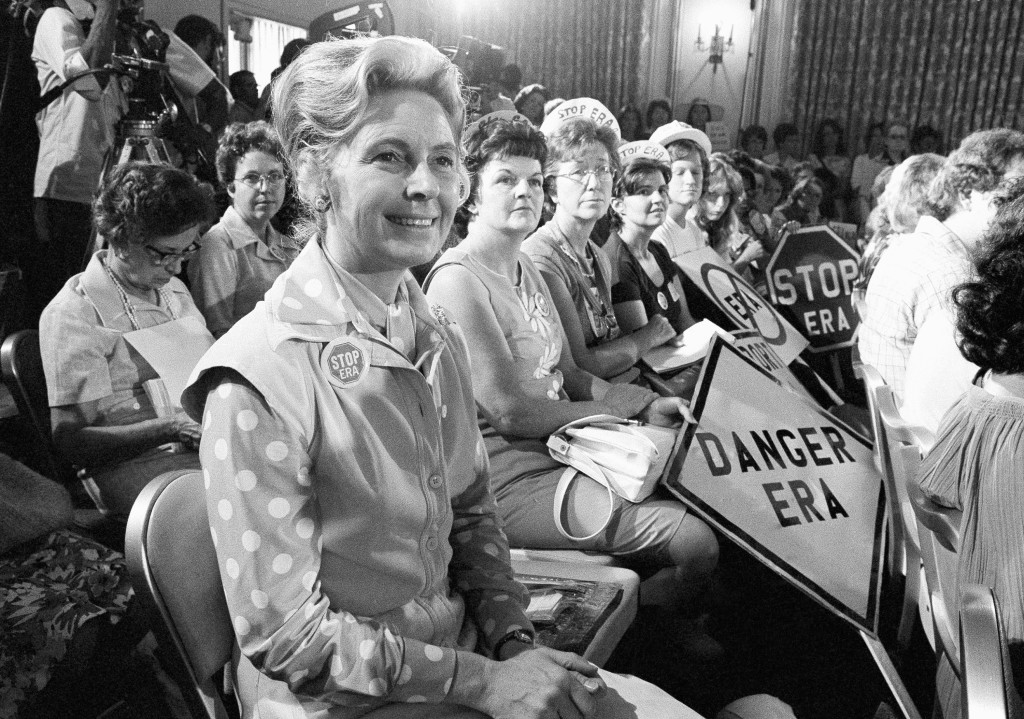
In this Aug. 10, 1976, file photo, women opposed to the Equal Rights Amendment sit with Phyllis Schlafly, left, national chairman of Stop ERA, at hearing of Republican platform subcommittee on human rights and responsibilities in a free society in Kansas City, Mo. One of the leading opponents of the ERA during the 1970s, the llinois lawyer launched a campaign called “Stop ERA” and is credited with helping mobilize public opinion against the amendment in some of the states that balked at ratifying it. (AP Photo/File)
Who is a “Good Woman?”
On its surface, this kind of logic doesn’t seem so offensive. After all, we all accept that there are good people and bad people. Are feminists saying that women are somehow exempt from that? Of course not. The issue here is that women are being judged by unfair, irrational standards that are nothing like that by which we judge men. What makes you a “good” woman in sexist thinking has little to do with whether you’re kind or even smart, but has more to do with adherence to unfair gender norms.
Women are judged more by their sexuality or their submissiveness than their actual character. So someone gets more points for being a virgin or being a doting housewife than they do for being smart and talented at their job. Or, in the case of Donald Trump, women are judged by their adherence to his very narrow views of what constitutes “fuckable,” and the rest are a waste of oxygen.
Another measure, at least in sexist thinking, of how good a woman is also has to do with how much she puts up with this crap. Women who smile politely or giggle indulgently when men say sexist or derogatory things are “good,” whereas women who talk back are bitches.
If you are a women that is caught up in this way of thinking, it’s very intoxicating to imagine that you’re one of the good ones, and to reinforce your status as a “Good Woman” by ganging up on the supposedly” bad” ones. There are a lot of benefits to being a female sexist, from that rush of self-righteousness you get from calling some other woman a slut to getting male approval when you agree with sexist men around you, for example, that Donald Trump’s nasty jokes about women are all in good fun.
Sadly, there are a lot of women, especially those living around conservative men,who find themselves agreeing with sexist community norms because it is simply less stressful. No one likes being told over and over again that they have a mouth on them or that they’re a bitch.
A recent footnote on Schlafly: For decades since the 70’s, Schlafly made it her mission to degrade and reduce women to submissive household slaves who have no other duty than to take a husband, become an incubator for fetuses, and leave jobs, politics, and education to the men. All of that should have been enough to make Schlafly a national pariah banished to the extreme fringe of society where she would never be seen or heard from again, but it apparently wasn’t. Now, it appears her downfall is finally near. As it turns out, Schlafly’s own daughter and several members of the Eagle Forum board who support Presidential candidate Ted Cruz are making an effort to oust the 91-year-old anti-feminist icon, all because she supports Donald Trump. While some might view Trump as an anti-women ignoramus, he can now claim to have done at least one good thing for women and our nation as a whole by duping Phyllis Schlafly into supporting him and destroying her own power in the process.
I Am Not a Feminist
The sad truth is some women get a kick out of policing and putting down other women. They may not get the status of men, but they can at least feel like they’re higher on the totem pole than some woman who flouts conservative gender norms about how women are supposed to dress, talk and behave. Alternatively, others feel redeemed that they have advanced (thank you feminists for paving the road) and are “beyond gender” by not advocating for a woman-centered politcs. Check out the “I Am Not a Feminist” social media meme, which traffics in the stock and trade of disavowing feminism on the basis that to identify as such is akin to being a “man-hater.”
Sluts Need Shaming
Not surprisingly, the anti-choice movement in particular is stuffed to the gills with women who are will to indulge in shaming politics; and it’s not because they actually believe the hype about an embryo being the same thing as a baby. Rather, it’s because policing other women’s sex and parenting behavior makes them feel good about themselves – like they are righteous and godly women trying to corral all those wayward sluts.
Slut shaming: the act of criticising a woman for her real or presumed sexual activity, or for behaving in ways that someone thinks are associated with her real or presumed sexual activity.
Slut-shaming is the experience of being labeled a sexually out-of-control girl or woman (a “slut” or “ho”) and then being punished socially for possessing this identity. Slut-shaming is sexist because only girls and women are called to task for their sexuality, whether real or imagined; boys and men are congratulated for the exact same behavior. This is the essence of the sexual double standard: Boys will be boys, and girls will be sluts.
In other words, if you are a heterosexual girl or young woman, you are damned if you don’t and damned if you do. If you refrain from any expression of sexiness, you may be written off as irrelevant and unfeminine. But if you follow the guidelines, you run the risk of being judged, shamed and policed (by both men and women).
The same trope often operates in the military, where if we recall in the film Invisible War, the women were accused of being “dykes” or “sluts” for the simple transgression of wearing makeup in uniform, as well as for confounding gender norms by volunteering service.
Slut-shaming is far more harmful than simple name-calling — although being denigrated publicly in itself can be traumatic, as the suicides of a number of slut-shamed girls attests. Once a girl or woman is regarded as a “slut” or “ho,” she becomes a target for sexual assault. And if she is sexually assaulted, she may be assigned the “slut” or “ho” identity ex post facto to rationalize the crime and to protect the assaulter.
Take for example the girl who was raped at a party by football players in Steubenville, Ohio in 2013. She was vilified by strangers and peers on Twitter, Facebook, Instagram and YouTube, where they could only make sense of the horrible crime by assigning the “drunken slut” label to the victim.
Likewise, Rush Limbaugh famously slut-shamed Georgetown law student Sandra Fluke for having the temerity to speak about gender equality by expressing her support for mandating insurance coverage for contraceptives and birth control.
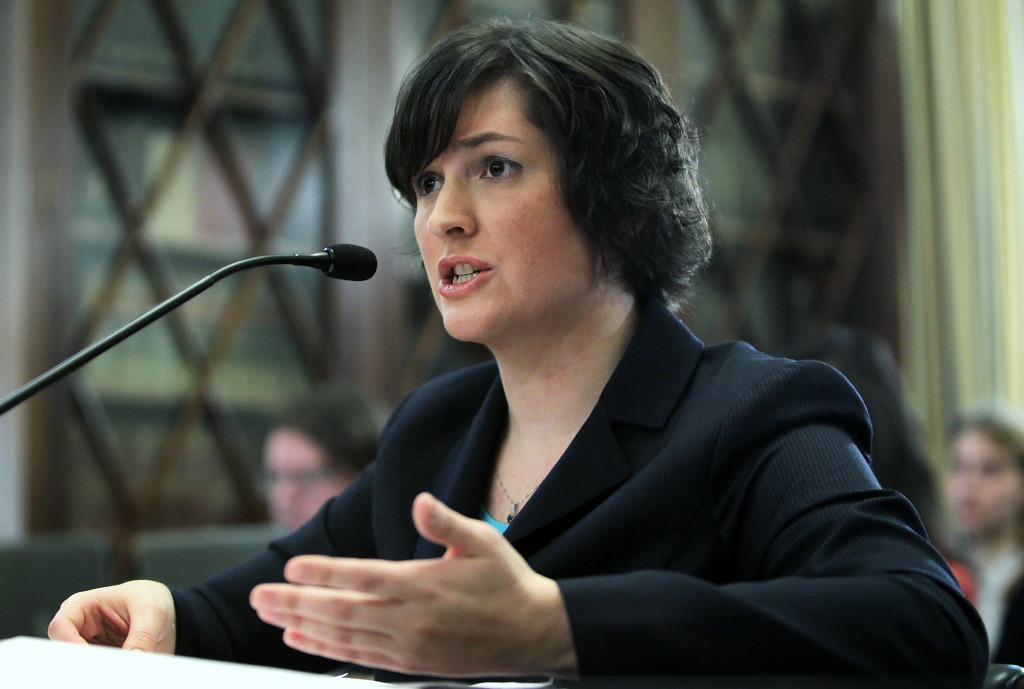
WASHINGTON, DC : Sandra Fluke, a third-year law student at Georgetown University, testifies during a hearing before the House Democratic Steering and Policy Committee February 23, 2012 on Capitol Hill in Washington, DC. Fluke was invited to testify at the hearing after she was blocked from testifying at last week’s House Oversight and Government Reform Committee’s contraceptives hearing. (Photo by Alex Wong/Getty Images)
Limbaugh argued:
“What does it say about the college co-ed Susan Fluke [sic], who goes before a congressional committee and essentially says that she must be paid to have sex, what does that make her? It makes her a slut, right? It makes her a prostitute. She wants to be paid to have sex. She’s having so much sex she can’t afford the contraception. She wants you and me and the taxpayers to pay her to have sex. What does that make us? We’re the pimps. (interruption) The johns? We would be the johns? No! We’re not the johns. (interruption) Yeah, that’s right. Pimp’s not the right word. Okay, so she’s not a slut. She’s “round heeled”. I take it back”
He continued and stated:
“Can you imagine if you’re her parents how proud of Sandra Fluke you would be? Your daughter goes up to a congressional hearing conducted by the Botox-filled Nancy Pelosi and testifies she’s having so much sex she can’t afford her own birth control pills and she agrees that Obama should provide them, or the Pope.”
As we’ve seen, slut-shaming is not really about women’s sexuality. It is grounded in the belief that men get to assert themselves, and women do not. It may be getting a lot of attention these days, but slut-shaming is really just a catchy way to signify old-fashioned sexism.
Virgins & Vamps
In her book Virgin or Vamp Helen Benedict conducts an in-depth analysis of the print media’s handling of sex crimes to make an argument about competing dualisms are used to characterize women as the “good” virgin and the “bad” vamp. Focusing on four widely reported rape cases, Benedict dissects the attitudes and language found in newspaper and magazine reports of the incidents. Here, she addresses the press’s tendency to misrepresent rape, denigrate victims, and invade the privacy of its subjects, while also pointing out the press’s critical role in informing and educating the public.
Benedict argues that the press overwhelmingly engages in the perpetuation of the myth of rape victims as falling into one of the two categories in what represents a variation of the familiar “Madonna/whore” dichotomy. Such extreme coverage, argues Benedict, perpetuates myths that are harmful to the victims of these crimes (and sometimes to the accused).
To illustrate, Benedict chooses the 1978 Rideout case of marital rape; the New Bedford, Mass., the gang rape that was the basis of the film The Accused; the murder of Jennifer Levin in the so-called “Preppie Murder Case”; and the “Central Park Jogger” trial of 1989-90. Each of these events was accompanied by lurid stories, which pit either a loose or a virginal woman against an unwilling or monstrous man.
Benedict begins with an informative overview of the press’s handling of sex crimes since the 1930’s. Here and throughout, she takes into account the intersections of race and class with gender. Too often she finds that reporters and editors denigrate women victims by using words such as “girl” and “bubbly.” Likewise, she calls attention to how alleged rapists’ defense lawyers rely on the “she was asking for it” line of argument and how press coverage play along, invariably going out of their way to highlight the most sensational aspects of sex-crime trials.
With the rise in reported rapes, Benedict warns myth-mongering stories are bound to increase and proliferate in the future.
Amber Rose and Blac Chyna put their haters on blast at the 2015 MTV Video Music Awards in Los Angeles. The two women showed up to the award show red carpet wearing matching skin-tight nude ensembles emblazoned with derogatory insults like “bitch,” “gold digger,” “stripper” and more. “They call us sluts and whores all the time, so we just embrace it,” Rose said. “I have slut written across my vagina.”
Sources
Virgin or Vamp: How the Press Covers Sex Crimes, by Helen Benedict. Oxford University Press (1992).
“The Mystery of Republican Women Backing Sexist Trump: They’re Female Misogynists Who’ve Grown Up To Accept Repression,” by Amanda Marcotte. Last Accessed May 2016
“The Truth About Slut Shaming,” by Leora Tanenbaum Last accessed May 2016
Discussion Questions
Do you have an experience of feeling trapped by the competing dualisms exemplified by this logic? What was your experience and how did you navigate the contradiction?
How do these logic systems potentially hurt both men and women?

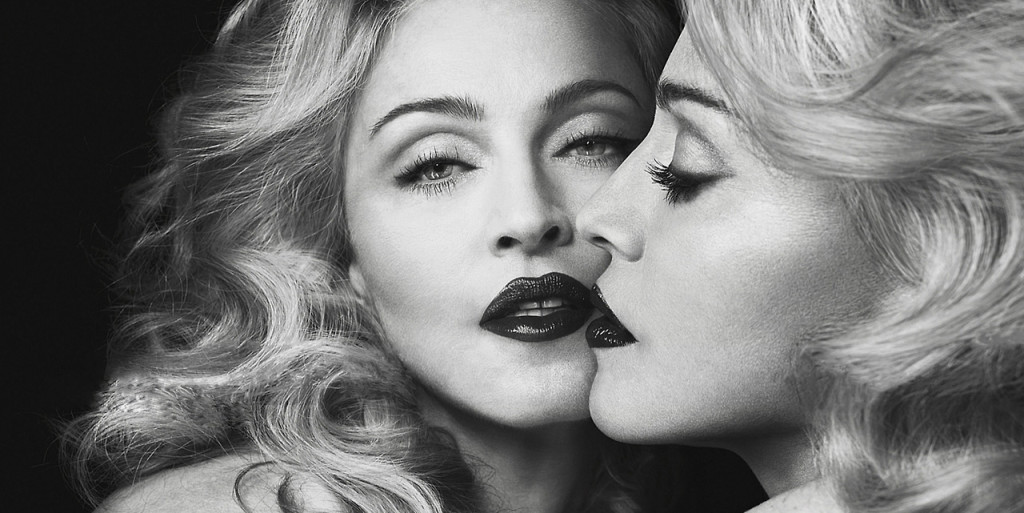
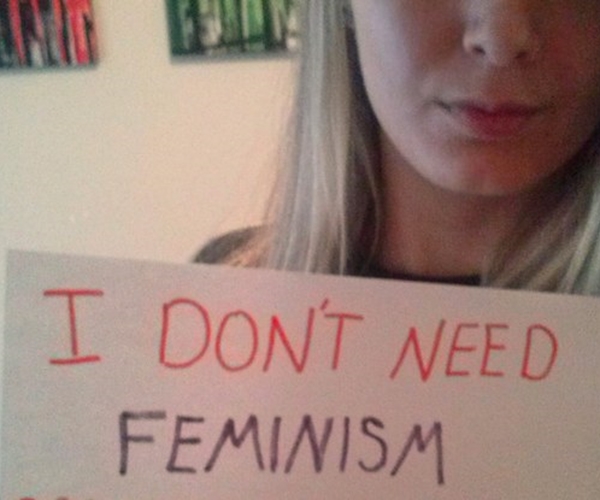
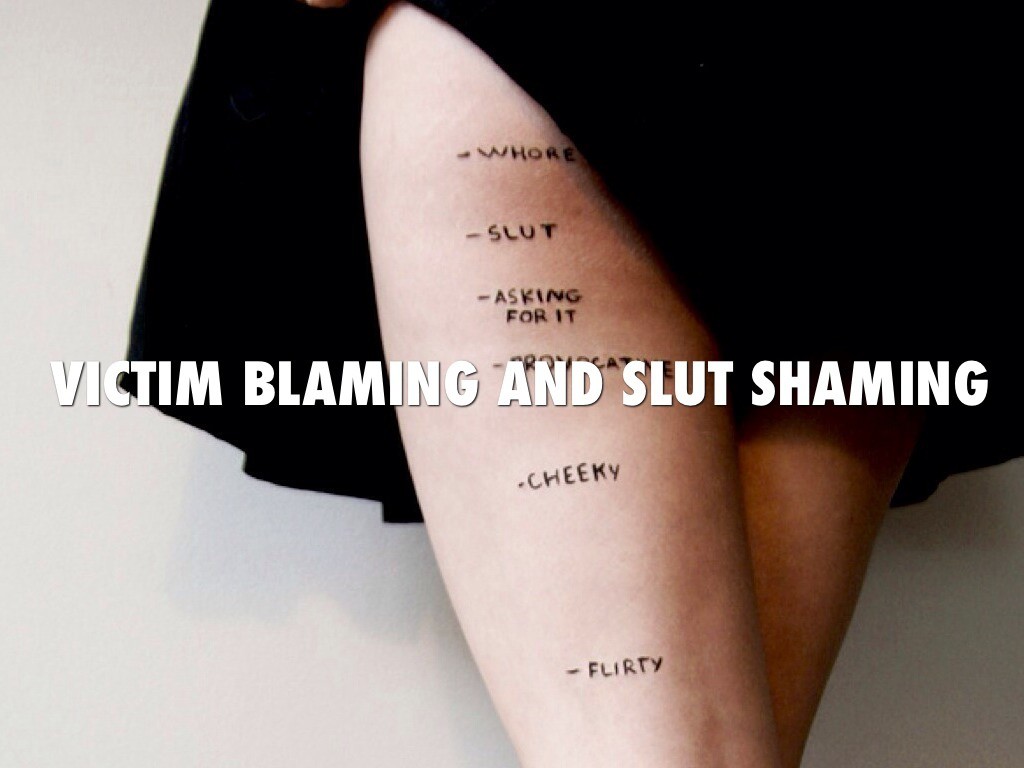
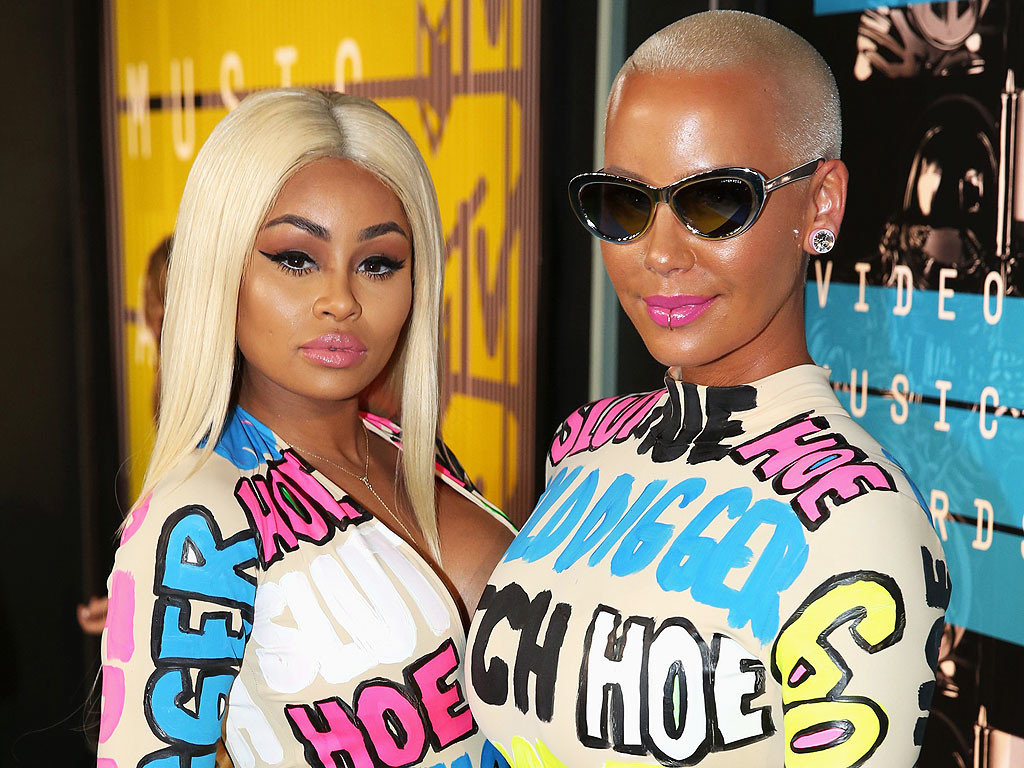
I left the Catholic church but it didn’t leave me. This patriarchal paradigm has given me nothing but unhappiness. I’ve spent 45 years trying to process the illogical. I don’t know what/how to think, so I simply stay away. No reason to spread my misery to others. I wont have kids because I don’t want this to spread. I’ll leave this world never understanding myself or the fairer gender but I won’t promulgate this fear/irrationality toward women.
One thing I’ve struggled with in relation to this topic is trying to be supportive, rather than harshly critical of women like Shafley, who are active contributors to their own oppression. When I really think about women I know who advocate for politicians who are blatantly misogynistic, or who condone when their male friends (or guys they are romantically interested in) are directly or indirectly disrespectful to women, I am honestly just deeply sad for them. I wonder how they’ve gotten this far without realizing that they don’t have to do this–they are strong, young women, living in 2016, and in most cases, on the verge of earning college degrees, which will have the same objective values as the degrees their male peers will also earn. In my experience, a common reason why young women I know remain this way is because they would be deemed unattractive and undesirable (actually, “undatable”) by their conservative male friends if they were to be outspoken against their politics. This is not something I feel like I could ever say to one of these women, because it too, comes off as shaming. I also wonder why it is that a woman would be attracted to misogynystic, disrespectful men in the first place. I think this could be attributed to how women are raised. If a woman grew up in a household in which conservative politics were the standard, and her father was the more dominant, leading, bread winning parent, and she believes that traditional ways are always the right ways, she is probably more likely to seek out a man who will provide this same dynamic for her later in life. So, I think in these instances, the woman is afraid of not ever having the lifestyle she had always envisioned, because she made herself unattractive by taking a stance for her rights and her dignity. But what kind of relationship is it for either the man or the woman, if it is built on the woman’s fear and sacrifice of dignity and expression, in exchange for simply having the relationship? What if every single woman decided together that we would not be silent anymore? That we would advocate for feminism, and that we would not consider a relationship with any man who could not handle that. This would ultimately force men to advocate for women, whether or not they want to initially, at least in order to continue dating, getting married, and ultimately continuing the species, which is a powerful biological instinct for most humans. I think sometimes, it helps to put things into the perspective of “why and how do we do anything we do?”, because then we can realize that everything we do is only made possible through the existence of one another. This realization has the potential to direct us all toward feminism (gender equality), because women cannot exist without men, just as men cannot exist without women.
What a profound read. I was expecting to get a list of “good girl” vs. “bad girl” traits, but I really appreciate the political bent of this entry.
I am sad for women such as Phyllis Schafly, and those who would follow her ideals and values. It takes a self sufficient woman to stand up for herself in whatever she endeavors to do with her life. Women like Phyllis Schafly are quick to label and judge women who take a stand and make decisions on what they aspire. Phyllis and her crew will be among the first to label women such as Amber Rose, Black Chyna, & Kim Kardashian “Sluts & Whores”, forgetting these women found financial gain via their sexual attributes, and not only became famous, but are household names. The media always has comments concerning all three of these women, and mostly in a positive light. It’s up to the individual female to decide whether or not she will comply with societal norms inherently limiting herself, or if she will go out on a limb and take a leap of faith.
The “holier-than-thou” act that women put on is so tired. The oppressed woman feels that she should project her inferiority onto another group, below her, the sluts and the whores. This gives them some of their power back, in being able to relate to the guys, and helps them deal with the ideology that was convinced of them. It is unfortunate that women have let men take over their way of thinking, especially when it comes to women. I am all for freedom of choice. No shame on the women who chooses to save herself for someone special, nor on the one who wants to express herself and be the sexual being we were created to be. It becomes an issue when we impose our opinions and judgements on others. That is when we break each other down and give rise to the sexist man and his ideas. I was not made to be judged by any man, nor any woman, and if a man called God can allow us free -will, then nosy Joe from down the street can not either impose on it.
The logic of women=incubators/virgins/weak/controlable hurts women and men but mostly women, by making them not only victims of the sexist system in which we live but, also by ensuring that women oppress themselves by internalizing the weak virgin mother narrative. Essentialist ideas such as women are inherently weak, biologically destined to be mothers, non-sexual/hypersexual beings (depending on race and class) allows for control from a patriarchal system, enforced by women who are the main transmitters of culture due to their role as mothers and children caretakers.
In some sense it makes sense that women themselves are one of their main oppressors, if throughout centuries women have been told that what gives them power is their virginal states, their mother/housewife roles, their concealed sexuality, that what makes them special is their quality as fetus incubators, they are going to defend this “qualities” for in some sense is what validates women’s existence, specially within the framework of white middle upper class females, who haven’t had the need to perhaps engage in sex work to make sure their children eat, who perhaps haven’t been raped by their drunk uncle who is also oppressed but racism/classism, who perhaps don’t know what it is to have to appeal to not only a heterosexist society but also a classist racist one. Women are not women because of their biology, women are women because of society.
Slut shaming is basically allowing people to justify rape culture. It is not fair that women have to be blamed for being open with their sexuality or being confident within their body. I feel this logic has been around forever and definitely needs to be 100% done with. Women should not have to be submissive towards the men in their lives. If magazines and newsletters can easily show men naked on the front cover, women should be able to do the same without being judged about her lack of clothes. Apart from men judging them, women feel the need to judge them as well. If woman merely is commenting to work, the gym or school she no doubly will be harassed. The amount of sexual harassment women will receive from men on the street is horrendous. And forget about if we talk back to defend ourselves because that is exactly what those men would want. I feel if a women is slut shaming another women because of the way she dresses or represents herself in society definitely has an insecurity problem. Today’s fashion where women are showing skin are automatically considered promiscuous, loose, or a hoe that is “easy.” I use the word “easy” because it gives men this idea that it would be easy to get into bed with her, when indeed any women would just wear shorts and a crop top because its really fucking hot outside. Also, i find that men seem to think that women dress “promiscuously” for them! As a woman myself, I can say that is not the case whatsoever. Women dress the way they want to for themselves in confidence and in hopes they can make a positive statement in the world of fashion.
This kind of logic hurts women, because it allows them tear each other down and it keeps/reinforces misogyny and sexism. It’s tragic that the women who support this kind of logic don’t seem to see how much it hurts women. I think this kind of logic potentially hurts men who are just entering the discussion of sexism towards women, because they might see the women who support this logic as proof that the twisted logic is not problematic.
This logic hurts women in that it not only holds women to an oppressive standard in regards to sexuality, which condemns them for engaging sexually, but at the same time, it encourages women to berate each other for the sake of social acceptance. When we look at politics more closely, women must not only sacrifice their rights, but in term become subservient to the extent in which they go on to attack the very same rights that they may be deserving of and that other women boldly fight for. This is seen as the only manner of mobility in the public’s eye and within one’s career as a politician; the act of blindly reinstating what men have said.
Furthermore, this form of sexism builds on all previous efforts for men to continue to instruct women how to govern their own bodies. And relying on the act of slut-shaming to vilify women who may engage sexually, no more than men. This is a problem because again, women are being held to a standard that has been constructed and constrained by that of the man.
I believe this goes on to hurt men also in that it reenforces this need to control and wield power over sex and sexuality, complementing the stereotype that men are sexually-focused.
The idea of slut-shaming, or even one of the I’m not a feminist/I don’t need feminism movement seems like a total cop out. It’s a way in which people who don’t want to think for themselves, and don’t actually have an opinion to ride the coat tails of taking a stand without having to think very hard.
I would say the same for women who say they are pro-life and buy the BS of a bunch of bible slinging evangelists telling you it’s not God’s choice for you or that of white men in politics trying to “protect the safety of women” . As if the core concept of reproductive rights is safety? It’s easier for those without an opinion or an undecided or mixed opinion to lean towards some mass perpetrated rhetoric than it is ask the questions that they have about sociopolitical issues. And it’s easier to point a finger at the slut because it makes the one wagging their finger seem like the very opposite. As if the logic here is, “Surely a slut wouldn’t sell out one of their own?”
But the effects are major, the whole, have an opinion/pick a side mentality rears some pretty ugly consequences. In rape or assault cases like the one mentioned in the article, or I’m sure in the 4 investigated in the book Virgin or Vamp, or in every Law and Order SVU episode I’ve ever seen… Be it this need to point the finger or the litigious nature of the US, You’re looking for an out or a scapegoat or someone to blame. And it takes away from some larger issues at hand I think. Look, if someone assaults someone it’s there fault. But it’s not so case by case, no pun intended, if we keep seeing the same archetypes of people coming up in law and order SVU portrays or in real life courts–the professor who, drunk with power takes advantage of a student or the trustfund kid who thinks he can buy the world takes it too far and kills a prostitute. You have to assume that we’ve somehow deemed it societal normal that everyone involved can fit into pretty little boxes: victim types and asking-for-it types; gang bangers or wrong-place-wrong timers.
I think slut shaming and speaking about women in such a heartless way is hurtful for both men and women. The biggest problem with this type of shaming is that we allow room for victim blaming. I would argue that most women feel compelled to speak this way to other women or about other women because of their own insecurities. Slut shaming is never okay and should not be something women or men engage in. It is harmful for women because it feeds stereotypes as well as it promotes hate within women (misogyny). Women that slut shame other women often judge them for what they wear, how they style their hair, how they speak or interact with men. The women that express disgust for other women’s appearance or persona are really trying to gain male approval and conceal their insecurities. They want to create a distinction between themselves and these other types of women that are sexually confident because they have a fear of being considered sluts or ho’s. The sad part of this is that while women are slut shaming other women, men feel like they are allowed to do it as well. This logic hurts men because they are degrading women with neither the knowledge nor right to do so. Men start believing that if women can refer to each other as sluts or ho’s that they can also express their opinions using those words. What they cease to forget is that these women could easily be their mothers, aunts, daughters or sisters.
Slut shaming is also wrong and hurtful for victims of sex crimes such as assault or rape. Often victims of rape have been called sluts for wearing a skirt that’s too short or getting drunk or asking for it. Both women and men fail to realize that anyone could be a victim, including men and children. Instead of focusing their energy in criminalizing the victim, they should blame the perpetrator for his crime. Below I have added an article that exemplifies the flaws in this type of logic and how it is not only hurtful for women but also men. I have found a cool YouTube video that argues against the idea “She Asked for It”.
Article: A Woman Was Slut-Shamed and Received Rape Threats for Quoting Drake on Her Tinder Profile:
http://mic.com/articles/124646/olivia-melville-was-slut-shamed-and-received-rape-threats-for-quoting-drake-on-her-tinder-profile#.rH9e4Lbpt
Laci Green on She Asked for It:
https://www.youtube.com/watch?v=dzwYptfRwTg
Your summary of the key issues is spot-on. Likewise, this video does a great job of doing the same. Thanks for sharing!
I do feel that I am trapped with the logic of being categorized by this logic. In this society everyone portrays a women to act and dress a certain way. She must listen to a male figure, act politely, keep her thoughts inside, and etc. I totally disagree. I believe every women have the right to express themselves. Where I”m from if a women is walking down the block or at a certain place and a man tries to flirt with them, and she rejects him, she is considered ” stupid”, ” slut”, ” bitch”, etc. Image also plays a factor. A women is portray to carry herself like a lady, and she must wear appropriate clothes. If she leaves the house wearing shorts, crop top, a very short dress, anything revealing, she is categorize as a “hoe”, “slut”, etc My dad is a perfect example of a men who likes to control women. He wants his wife to cook him dinner, and follow his orders. My father and I always argue because unlike my mother I actually talk back to him and say whats on my mind. My dad always told me ” If you keep acting this way no man, is going to want you”. Unlike these women that accepts the norm, I rather not identify myself with them.
I do feel like I’m trapped by this logic of being categorized by other women. My biggest thing is that other women talk about other women because they envy the ideas that have been set iin place of what a woman is supposed to look, act and sound like. Women are put into a bubble where they have to live by certain standards and do things a certain way just because they are a woman. Another this aspect of life can potentially harm men and women because the way things are changing within people and now, so to speak, theres no definite definition of what gender is. People identify themselves so differently that there can’t be just 2 definitions for it. There can’t be just man and woman anymore. Now theres women that want to be considered a girl with a manly side or men that are very emotional like a woman was set to be. So there cant be anything set in that aspect.